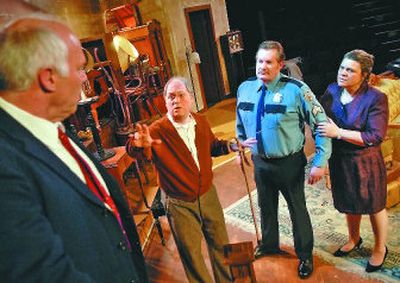The ‘Price’ wars

When people think of Arthur Miller they don’t always think of “The Price.” Yet this 1968 drama was Miller’s biggest critical and commercial Broadway hit except for “Death of a Salesman.”
It’s a tense, compact family saga with many of the elements that made Miller one of the key American playwrights of the 20th century.
Two brothers meet at the family’s old New York brownstone to dispose of their deceased father’s estate. One is a doctor and one is a New York beat cop. Their long-simmering resentments gradually rise to the surface in what is widely considered to be a classic Miller family confrontation.
“It’s not overtly a political play,” said Reed McColm, who directs this Interplayers production. “It’s more concerned with personal issues. But it grapples with issues of fiscal and moral responsibility.”
As one character points out, “There is such a thing as a moral debt.”
McColm said the play deals with classic Miller themes: self-sacrifice and our responsibilities to our parents.
The Broadway original featured Arthur Kennedy and Pat Hingle as the two brothers.
This Interplayers production has Maynard Villers and Terry E. Snead in those roles, Maria Caprile as Esther and McColm as Solomon, an aging Jewish furniture dealer.
McColm took over the role himself after three other Solomons dropped out of the production.
“As an actor, I have a real jerk for a director,” he joked.
McColm called directing and acting in the same show “a challenge,” but added that it was “energizing.”
He is also a writer. It was in that capacity that he met Miller while in a writing class at the University of Southern California.
McColm wrote a play that his instructor, the famed Jerome Lawrence (“Inherit the Wind”), discussed with some of his fellow writer friends. One of them wrote a note on the back of a napkin suggesting that an earlier line should be made the play’s closing line.
“So Jerome Lawrence said to me, ‘Artie Miller thinks you should use this as your closing line,’ ” McColm recalls. “I said, ‘Why should I listen to Artie Miller?’ “
Because Artie is Arthur, that’s why.
When McColm realized that one of America’s great playwrights was making the suggestion, he did attempt to move that line to the end, but later decided it didn’t work.
So when Miller unexpectedly showed up at the play’s first performance, McColm panicked and tried to talk the cast into switching the line to the end again. They refused.
Miller was too gracious to mention it. He told McColm that he liked the play.
“All I could do was mutter, ‘I like your plays, too,’ ” said McColm.